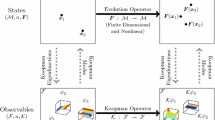Abstract
The foundation of statistical mechanics and the explanation of the success of its methods rest on the fact that the theoretical values of physical quantities (phase averages) may be compared with the results of experimental measurements (infinite time averages). In the 1930s, this problem, called the ergodic problem, was dealt with by ergodic theory that tried to resolve the problem by making reference above all to considerations of a dynamic nature. In the present paper, this solution will be analyzed first, highlighting the fact that its very general nature does not duly consider the specificities of the systems of statistical mechanics. Second, Khinchin’s approach will be presented, that starting with more specific assumptions about the nature of systems, achieves an asymptotic version of the result obtained with ergodic theory. Third, the statistical meaning of Khinchin’s approach will be analyzed and a comparison between this and the point of view of ergodic theory is proposed. It will be demonstrated that the difference consists principally of two different perspectives on the ergodic problem: that of ergodic theory puts the state of equilibrium at the center, while Khinchin’s attempts to generalize the result to non-equilibrium states.
Similar content being viewed by others
References
Badino, M. (2005). I due problemi fondamentali della meccanica statistica, La Goliardica, Pavia, forthcoming.
R.W. Batterman (1998) ArticleTitleWhy Equilibrium Statistical Mechanics Works: Universality and the Renormalization Group Philosophy of Science 65 183–208 Occurrence Handle10.1086/392634
S.G. Brush (Eds) (1986) The Kind of Motion We Call Heat Amsterdam North Holland
K. Friedman (1976) ArticleTitleA Partial Vindication of Ergodic Theory Philosophy of Science 43 151–162 Occurrence Handle10.1086/288675
Gallavotti. G. (1982). Aspetti della teoria ergodica qualitativa e statistica del moto. Pitagora, Bologna.
G. Gallavotti (1999) Statistical Mechanics Springer–Verlag New York
Y.M. Guttmann (1999) The Concept of Probability in Statistical Physics Cambridge University Press Cambridge
A. Haar (1933) ArticleTitleDer Massbegriff in der Theorie der Kontinuierlichen Gruppen Annals of Mathematics 34 147–169 Occurrence Handle10.2307/1968346
R. Jancel (1963) Foundations of Classical and Quantum Statistical Mechanics Pergamon London
A.I. Khinchin (1949) Mathematical Foundations of Statistical Mechanics Dover New York
D. Malament S. Zabell (1980) ArticleTitleWhy Gibbs Phase Average Work – The Role of Ergodic Theory Philosophy of Science 47 339–349 Occurrence Handle10.1086/288941
M. Mathieu (1988) ArticleTitleOn the origin of the notion of Ergodic theory Expositiones Mathematicae 6 373–377
J.C. Oxtoby (1980) Measure and Category Springer New York
J. Von Plato (1982) ArticleTitleThe Significance of the Ergodic Decomposition of Stationary Measures for the Interpretation of Probability Synthese 53 419–432 Occurrence Handle10.1007/BF00486158
Von Plato, J. (1987). Probabilistic Physics: The Classical Way. In L. J. Daston, M. Heildeberg, L. Krüger (eds.), The Probabilistic Revolution. Cambridge: MIT Press, 379–407.
J. Von Plato (1992) ArticleTitleBoltzmann’s Ergodic Hypothesis Archive for the History of exact Sciences 44 71–89
J. Von Plato (1994) Creating Modern Probability Cambridge University Press Cambridge
L. Sklar (1993) Physics and Chance Cambridge University Press Cambridge
P. Quay (1978) ArticleTitleA Philosophical Explanation of the Explanatory Function of Ergodic Theory Philosophy of Science 45 47–59 Occurrence Handle10.1086/288778
Truesdell, C. (1961). Ergodic Theory in Classical Statistical Mechanics. Rendiconti della Scuola Internazionale di Fisica ‘Enrico Fermi’, XIV, New York: Academic Press, 21–56.
Author information
Authors and Affiliations
Corresponding author
Rights and permissions
About this article
Cite this article
Badino, M. The Foundational Role of Ergodic Theory. Found Sci 11, 323–347 (2006). https://doi.org/10.1007/s10699-005-6283-0
Issue Date:
DOI: https://doi.org/10.1007/s10699-005-6283-0




